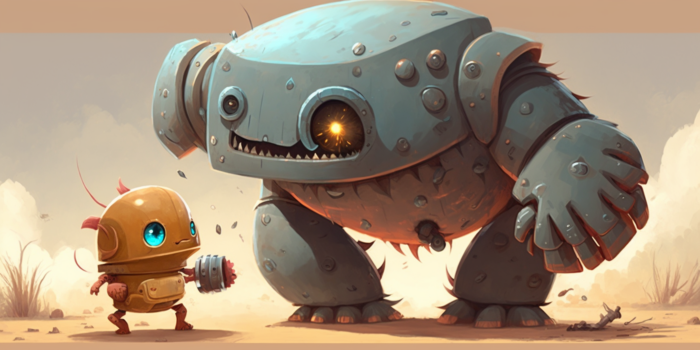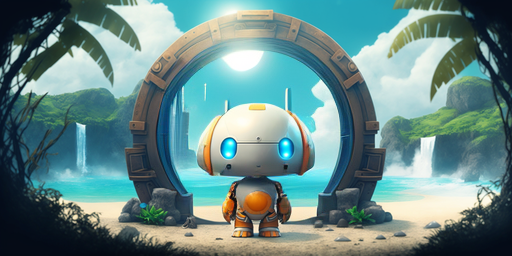At Hypergrid Business, we’ve been covering OpenSim and other desktop-based virtual environments since 2009, and began covering virtual reality extensively in 2014.
Our goal has been to promote an open-source, distributed metaverse, and to help the little guy and gal with navigating that landscape. Specifically, the people running OpenSim-based virtual worlds — because I think that OpenSim is a great role model of how to create an interconnected, open-source metaverse.
Today, I believe we’ve entered a new era for small business. Well, not today today. More like, on Nov. 30, 2022, when ChatGPT was released.
People worry that AI will take their jobs, and will gut the creative industries. That will probably happen. And there are lawsuits being filed right and left and government regulators trying to figure out how to prevent the worst consequences, and columnists opining about all of this at length. The criticism are fair, and do need to be addressed. I don’t disagree with that.

But there’s a flip side to the technology.
AI can be a power multiplier. Like what happens when you replace a stone axe with a power saw. (I’ve been watching a lot of Primitive Technology videos lately.)
In the hands of the big players, it can be devastating. But the big guys tend to be slow to adopt new technologies because they have a lot of institutional inertia and can’t turn on a dime.
In the hands of the little guys, AI can be extremely powerful. Any disruption is an opportunity for a small company to seize market share and grow big, and I believe that AI is going to be a bigger disruption than any we’ve seen before.

“Today, the scale of the largest AI computations is doubling every six months, far outpacing Moore’s Law,” Google CEO Sunchar Pichal said in a post on Monday.
Moore’s Law is about technology doubling every two years.
Now imagine it doubling every six months.
Just think of how much change we’ve seen in the past couple of decades — the Internet, the World Wide Web, smartphones. This year, global smartphone penetration is expected to hit 89 percent. Pretty much everyone on the planet, no matter where they live, either has a smartphone or knows someone who does, and can access all of the world’s information. For those without deep pockets, the Android operating system is free, meaning that a couple of years ago I bought my grandmother a smartphone at Walmart for under $30 that did nearly everything my $800 phone did and had a bigger screen to boot — in emerging countries, the phones are even cheaper. Web browsers are free. Web translation is free, for more than 100 languages. Online maps and turn-by-turn directions are free. Weather reports are free. The world’s biggest and most up-to-date encyclopedia is free. You can take online programming courses and earn certificates, for free.
Access to the Internet has put immense power in the hands of individuals and small businesses around the planet. The world is very different from what it was at the turn of the century.
All that knowledge and communication has changed societies — and accelerated scientific progress. We’re editing our own DNA. We’ve cracked fusion and quantum computing. We’re flying drone helicopters on Mars. We’re planning a permanent base on the Moon and building space industry infrastructure.
I am extremely excited to be alive today. It’s scary. All the stuff we’re doing can go wrong very easily, AI included. But there are also immense opportunities.
Sure, not every technology is a slam dunk. There are plenty of platforms out there desperately searching for use cases including, I’m sorry to say, virtual worlds.
AI isn’t in the category. AI is all use cases, all the time.
It’s already being deployed as a force multiplier in every single industry, and is the top priority for pretty much every CEO of every major company on the planet. Until last fall, regular people got to use AI when it was embedded into day-to-day tools, like search engines or recommendation apps. Big companies use AI directly, because they have teams of data scientists on staff.
ChatGPT changed that. On Nov. 30, it made direct access to AI easy and free for people.
ChatGPT grew to 1 million users within five days of its release. In January, it hit 100 million users, according to USB.
“In 20 years following the Internet space, we cannot recall a faster ramp in a consumer Internet app,” USB analysts said in a research note.
According to VR visionary John Carmack, AI will soon be able to simulate the human brain — probably within this decade.
ChatGPT and other generative AI like image generators and voice and video generators, have pushed the boundaries of what AI can do into an area that many experts that I talked to a couple of years ago said was impossible with current technology. AIs with common sense were still decades away, they said.

Turns out, common sense and creativity are emergent abilities when AI systems get big enough — some of 137 emergent abilities of large language models like ChatGPT. That means that ChatGPT can do things that can’t be explained by the fact that it is “auto-complete on steroids” or a “stochastic parrot.” Yes, it looks for correlations and uses statistics to predict what to say next. But at a certain point, with enough training data, and enough parameters, weird stuff starts to happen. Like, for example, ChatGPT can pretend to be someone else and answer questions like they would — even if that particular scenario has never been seen before.
That’s the reason why ChatGPT is taking off, while previous AI powered chatbots didn’t. It’s reached a point where it is actually usable. And people are using it. They’re using it for a million minor tasks, like creating recipes out of food they have in their refrigerators, to writing code, to learning complex topics. Yes, it makes mistakes. Yes, it’s bad at math. No, it can’t access the Web. But OpenAI is working on addressing those issues, and so are all of its competitors.
ChatGPT already has a million use cases.
And it’s ridiculously easy to use. Just go to chat.openai.com and ask it questions. But just because it’s easy to use doesn’t mean that it’s easy to use it well. It’s like playing a keyboard. Yes, pressing keys and getting pretty sounds is pretty easy, much easier than, say, trying to do the same on a violin. But getting it to play what you want — well, that’s the trick, isn’t it?
So how do you use AI effectively as a tool? How do you surf the new wave of technology, instead of being drowned by it? That’s the question I’m going to try to answer.
During the day, I write about AI for major tech publications, like CIO magazine. I cover how large companies are taking advantage of AI to improve efficiency, find new business models, and better connect with customers.
At Hypergrid Business, I plan to do the same, but from the viewpoint of individual users and small businesses. Small businesses like OpenSim grids.
AI and OpenSim
So, what that means is that we’re going to be increasing our AI coverage here at Hypergrid Business.
I’ve already been writing about AI on this blog. One of my most popular recent articles is about how to use ChatGPT to write a press release. I used an imaginary OpenSim grid as my example, but I could have used a real OpenSim grid instead. More than a thousand people have read that article, many of whom were hearing about OpenSim for the first time.
Does your OpenSim grid, or OpenSim-related product or service, use AI?
Maybe you have an AI-powered NPC on your grid. Or use AI to help design your website or create content. Do you have an AI-powered game in your world? Do you have AI-powered tech support for your grid or OpenSim hosting company?

Let me know, and I’ll write an article about it.
There’s a huge appetite for AI news and use cases out there right now. Tell me about your AI projects and you can get a lot of attention for what you’re working on.
This is also a great opportunity for someone to break into technology journalism. If you’re interested in covering AI — or covering OpenSim, of course — email me. I’ll teach you how to write in Associated Press style, connect you with sources, and help you build your professional portfolio.
Email me at maria@hypergridbusiness.com with story ideas — or to find out how to get started as a technology journalist.
- OSCC 2024 Submission Deadline Approaching - October 19, 2024
- AvatarLife Viewer adds video calls, screen sharing - October 19, 2024
- Spooky season brings more visitors to OpenSim worlds - October 15, 2024
